19 листопада 2025 року викладачі кафедри економіки, менеджменту та фінансів доценти кафедри Катерина Леміш, Олена Токаренко, Тетяна Сидорченко та старша викладачка Вікторія Швачко взяли участь у Науково-практичному форумі «Фінансове забезпечення сталого розвитку територіальних громад», організованому НаУ «Острозька академія». Захід об’єднав провідних науковців, експертів з публічних фінансів, представників органів державної влади та місцевого самоврядування.
Під час заходу учасники обговорили широкий спектр питань, пов’язаних із фінансовою спроможністю громад та викликами відбудови в умовах воєнного і післявоєнного періоду. Серед ключових виступів: Проблеми та виклики фінансування сталого регіонального розвитку в Україні (проф. Надія Давиденко, проф. Валентина Мартиненко). Спікерки представили детальний аналіз фінансових ресурсів місцевого самоврядування, динаміку доходів і трансфертів за 2015–2024 роки, окреслили вплив глобальних Цілей сталого розвитку ООН на формування місцевої політики та підкреслили важливість ролі громад у забезпеченні якості освіти, охорони здоров’я, розвитку міст та зменшення нерівності. Фінансова децентралізація 2.0 та потенціал RWA-токенізації (М. Рябокінь, Є. Котух) – було розглянуто сучасний стан фінансової децентралізації, окреслено додаткові виклики воєнного періоду — руйнування інфраструктури, зміни демографічної структури, зниження економічної активності. Доповідачі представили інноваційну модель залучення інвестицій через токенізацію реальних активів, що відкриває громадам нові можливості для фінансування інфраструктурних проєктів.
Ці блоки стали змістовним підґрунтям дискусії про фінансову стійкість громад, інструменти розвитку та необхідність модернізації підходів до управління місцевими бюджетами.
Окремий інтерес для нашої кафедри викликала презентація Тетяни Тимошенко, PhD, доцентки КНЕУ, президентки Федерації роботодавців України в сфері туризму, експерта з розвитку туристичних дестинацій, громад і територій та представника стейкхолдерів нашої освітньої програми.
У своїй доповіді «Бізнес-моделі для відновлення і сталого розвитку громад: роль туризму в залученні приватного капіталу» вона висвітлила можливості соціального підприємництва для підтримки жінок, ветеранів, молоді, ВПО; кооперативні моделі, як-от «банк ліжкомісць» та хаби майстрів, що сприяють легалізації місцевих бізнесів; роль краудфандингу та спільнокоштів у фінансуванні соціальних і туристичних проєктів; важливість розвитку ланцюгів доданої вартості (від локальної сировини до туристичного продукту); потенціал публічно-приватного партнерства у відновленні об’єктів історико-культурної спадщини.
Хоча туристична тематика не була центральною у програмі Форуму, її представлено як важливий компонент стратегії розвитку громад. Для нашої кафедри, що реалізує ОП «Менеджмент готельного, курортного та туристичного сервісу», цей виступ став цінним прикладом інтеграції туризму в економічну модель відбудови територій та підтвердив актуальність підготовки фахівців, здатних працювати в цій сфері.
Участь у Форумі дала можливість викладачам кафедри ознайомитися з актуальними тенденціями у сфері публічних фінансів і децентралізації; проаналізувати сучасні інструменти фінансування відновлення територіальних громад; зміцнити взаємодію зі стейкхолдерами освітніх програм; інтегрувати отримані результати в освітній процес бакалаврських і магістерських програм кафедри.
Форум підтвердив важливість синергії між наукою, державою та місцевим самоврядуванням у формуванні фінансово спроможних та стійких громад України.
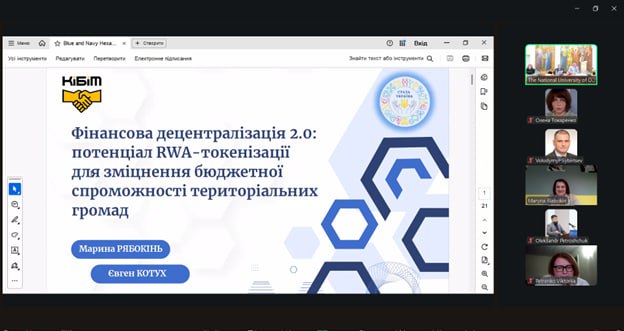
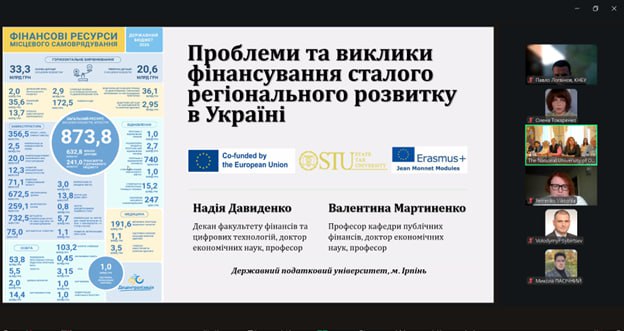
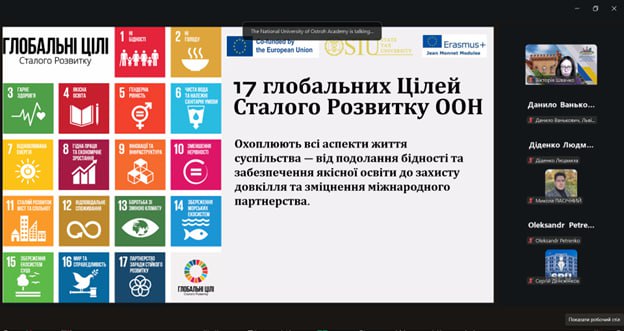
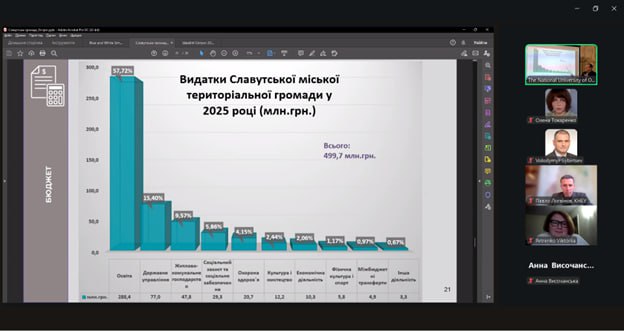
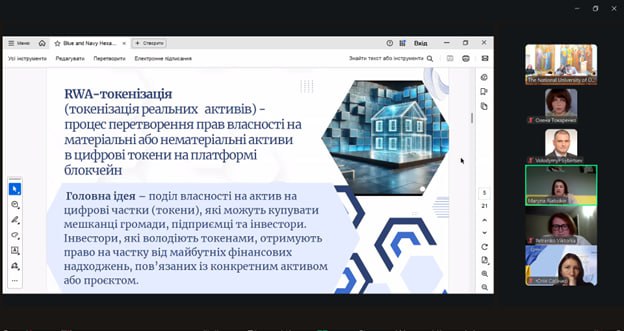
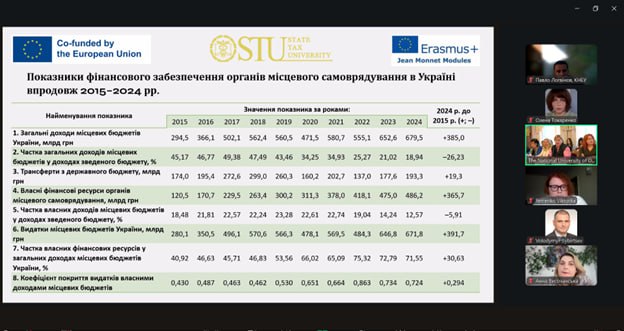
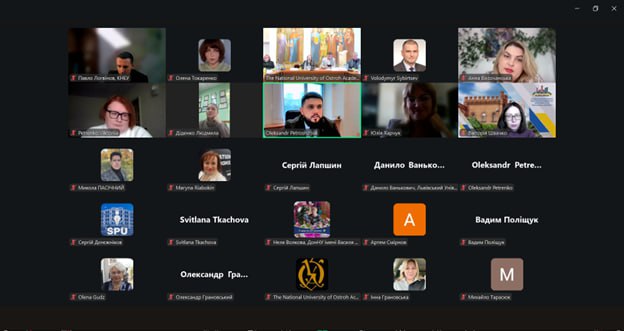
За матеріалами кафедри економіки, менеджменту та фінансів
Faculty of the Department of Economics, Management and Finance Attended the Scientific and Practical Forum “Financial Support for Sustainable Development of Territorial Communities”
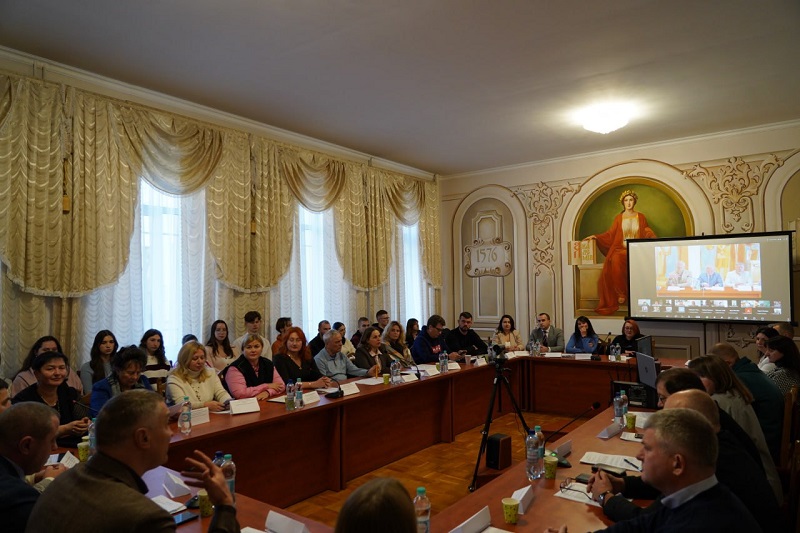
On 19 November 2025, the faculty members of the Department of Economics, Management and Finance — Associate Professors Kateryna Lemish, Olena Tokarenko, Tetiana Sydorchenko, and Senior Lecturer Viktoriia Shvachko — took part in the Scientific and Practical Forum “Financial Support for Sustainable Development of Territorial Communities”, organized by the National University of “Ostroh Academy”. The event brought together leading scholars, public finance experts, and representatives of state authorities and local self-government.
During the Forum, participants discussed a wide range of issues related to the financial capacity of communities and the challenges of reconstruction in the wartime and post-war periods. Among the key presentations were: Challenges and Issues of Financing Sustainable Regional Development in Ukraine (Prof. Nadiia Davydenko, Prof. Valentyna Martynenko). The speakers presented a detailed analysis of the financial resources of local self-government, the dynamics of revenues and transfers from 2015 to 2024, highlighted the influence of the UN Sustainable Development Goals on local policy formation, and emphasized the crucial role of communities in ensuring quality education, healthcare, urban development, and reducing inequalities. Financial Decentralization 2.0 and the Potential of RWA Tokenization.(M. Riabokin, Ye. Kotukh). This presentation outlined the current state of financial decentralization in Ukraine and additional wartime challenges such as infrastructure destruction, demographic changes, and declining economic activity. The speakers also showcased an innovative model for attracting investment through tokenization of real-world assets, opening new opportunities for communities to finance infrastructure projects.
These thematic blocks formed a meaningful basis for discussions on community financial resilience, development tools, and the need to modernize approaches to managing local budgets.
A particular area of interest for our department was the presentation by Tetiana Tymoshenko, PhD, Associate Professor at KNEU, President of the Federation of Ukrainian Federation of Employers in Tourism, and a stakeholder of our educational program.
In her talk “Business Models for Community Recovery and Sustainable Development: The Role of Tourism in Mobilizing Private Capital”, she highlighted opportunities of social entrepreneurship to support women, veterans, youth, and IDPs; cooperative models such as a “bed-place bank” and artisan hubs, which help local businesses formalize their activities; the role of crowdfunding and community funding in financing social and tourism projects; the importance of developing value chains (from local raw materials to tourism products); the potential of public–private partnerships in restoring cultural and historical heritage sites.
Although tourism was not the central topic of the Forum, it was presented as an important component of community development strategies. For our department, which implements the educational program “Management of Hotel, Resort, and Tourism Services”, this presentation offered a valuable example of integrating tourism into the economic model of territorial recovery and reaffirmed the relevance of training specialists who can work effectively in this field.
Participation in the Forum enabled the faculty members to explore current trends in public finance and decentralization; analyze modern tools for financing community recovery; strengthen cooperation with stakeholders of educational programs; integrate the acquired insights into bachelor’s and master’s curricula of the department.
The Forum once again highlighted the importance of synergy between academia, government institutions, and local self-government in building financially capable and resilient communities in Ukraine.







Prepared by the Department of Economics, Management and Finance
